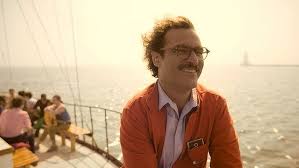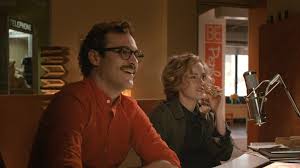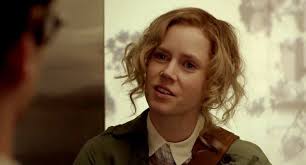
Rated R for language, sexual content and brief graphic nudity
Mad Cow’s rating: ![]()
Generally I dislike science fiction because there never seems any internal logic to it. A bunch of people are in a space ship when all of a sudden their evil enemies decide to attack them. They reach for the ardinator to defend themselves. But wait, it isn’t working! So Thoraden, trusty man/robot, is called upon to fix it with his new invention the shelftab fabricator. Luckily it works. And so on. There is no point in even speculating about what is going to happen next because anything could happen next, the laws of nature and human technology suspended for the story. But I make exceptions. Inception, somewhat incomprehensible, was fun and Memento was amazing. And then there’s Her, just a “little†sci-fi, set in perhaps the near-distant future.
Written and directed by Spike Jonze (Where the Wild Things Are, Adaptation, and Being John Malkovich) Her introduces us to  Theodore Twombley (Joaquin Phoenix, The Master, Reservation Road, Walk the Line) at his job, at BeautifulHandwrittenLetters.com where he creates entire letters for people to send to their relatives. Like an extension of the greeting card industry, this industry features writers who send love letters, lengthy thank-you notes, and other greetings based on knowledge of the people involved, often carrying on a correspondence for years. We first meet him dictating a letter from a man to his wife on the occasion of their fiftieth wedding anniversary. It’s lovely even as it isn’t really from the actual person. Theodore is very good at it, even though his own life is a bit messed up.
Theodore Twombley (Joaquin Phoenix, The Master, Reservation Road, Walk the Line) at his job, at BeautifulHandwrittenLetters.com where he creates entire letters for people to send to their relatives. Like an extension of the greeting card industry, this industry features writers who send love letters, lengthy thank-you notes, and other greetings based on knowledge of the people involved, often carrying on a correspondence for years. We first meet him dictating a letter from a man to his wife on the occasion of their fiftieth wedding anniversary. It’s lovely even as it isn’t really from the actual person. Theodore is very good at it, even though his own life is a bit messed up.
Theodore has lived apart from his wife for several months but his apartment looks like he just moved in yesterday, with unhung pictures and stuff piled about. He misses his wife Catherine (Rooney Mara, The Girl with the Dragon Tattoo, Social Network, and Side Effects) and is putting off signing the divorce papers. He’s lonely but mostly refuses even to date anyone. Then he sees an ad for the new OS1, “It’s not just an operating system, it’s a consciousness.†He seeks a “woman†and gets Samantha (Scarlett Johansson, The Avengers, Hitchcock, Lost in Translation), who is there to get to know him and grow psychologically in their relationship. Soon he’s in love, and she is too.
 Jonze is a quirky writer/director but somehow he hits the mark. As we watch Theodore and Samantha get to know each other, we can see the attraction. At first she just organizes his contacts and emails and helps edit his work, in seconds (a valuable quality in a friend). They discuss things, they joke, and they laugh. He takes her “out,†the camera end of his phone poking out of his shirt pocket. They double date (with Samantha on speaker phone). She doesn’t just obey commands, but has opinions and argues with him from time to time. And tells him she loves him. So then, what is love? What is a relationship? Does it require a physical presence or just a personality? Can a machine have a personality?
Jonze is a quirky writer/director but somehow he hits the mark. As we watch Theodore and Samantha get to know each other, we can see the attraction. At first she just organizes his contacts and emails and helps edit his work, in seconds (a valuable quality in a friend). They discuss things, they joke, and they laugh. He takes her “out,†the camera end of his phone poking out of his shirt pocket. They double date (with Samantha on speaker phone). She doesn’t just obey commands, but has opinions and argues with him from time to time. And tells him she loves him. So then, what is love? What is a relationship? Does it require a physical presence or just a personality? Can a machine have a personality?
Theodore’s human relationships contrast with his OS one. His close friend Amy (Amy Adams, American Hustle, Many of Steel, Trouble with the Curve, The Master), who lives upstairs in his building, supports him and tries to help him, including telling him essentially to go for it, since everyone deserves joy. Amy and her husband (Chris Pratt, Moneyball, Parks and Recreation) bicker over physical things, like dishes and clutter. Yet she, who designs video games, has befriended her husband’s female OS and become close friends with her. His soon-to-be ex-wife Catherine is less understanding that he’s “in love with his computer.â€
Over time the disadvantages of the OS relationship and perhaps the weirdness of it begin to bother Theodore. He discovers that Samantha has other relationships both with real people and other OS’s. The only sex they can have is phone sex and an alternative offered by Samantha doesn’t work well for him. Ultimately the OS may not be the answer for him, or might be, later when it’s perfected to his requirements. And what will we do when it arrives?
Phoenix as Theodore is suitably sweet, smart, confused and disillusioned. We don’t know why he and his wife broke up but can intuit it as  he comes across as a kind of nebbish. Amy too. Ex-wife Catherine is likeable but much more “together,†whatever that means. She is an attorney and perhaps better grounded in the real world. One flashback memory of his marriage shows Catherine with a baby, which may represent wishful thinking, maybe reality. So, what about children? Jonze gives us one more thing to think about although of course the subject children is the elephant in the room.
he comes across as a kind of nebbish. Amy too. Ex-wife Catherine is likeable but much more “together,†whatever that means. She is an attorney and perhaps better grounded in the real world. One flashback memory of his marriage shows Catherine with a baby, which may represent wishful thinking, maybe reality. So, what about children? Jonze gives us one more thing to think about although of course the subject children is the elephant in the room.
At the start of the film I was delighted to see Theodore exiting the subway with his phone in his ear, getting an oral rundown of his emails and commanding his computer/phone to delete, save until later, etc. Wow. Would I like that! The letter thing is a little iffy and of course the OS is over the top. And yet these developments are disturbing and thought provoking. We are already in an era in which we often would rather not relate to each other face to face. Will it get to the point that it’s unappealing for us to touch each other, nurse each other back to health, live with a spouse with a bad cold or worse? Put up with those annoying habits of another person?
 I have known several people who have fallen in love with others on the internet. I was going to put quotation marks around “in love†but who am I to judge? Someone’s words alone, in writing, produced this emotion. What about just a voice? And what if you found out that the other is a virtual being? A wonderful classic New Yorker cartoon shows a dog at the computer, saying “On the internet no one knows you’re a dog.†Too true. Most people who meet on the net eventually arrange to meet in person. What if they decided not to meet? Would they still be in love?
I have known several people who have fallen in love with others on the internet. I was going to put quotation marks around “in love†but who am I to judge? Someone’s words alone, in writing, produced this emotion. What about just a voice? And what if you found out that the other is a virtual being? A wonderful classic New Yorker cartoon shows a dog at the computer, saying “On the internet no one knows you’re a dog.†Too true. Most people who meet on the net eventually arrange to meet in person. What if they decided not to meet? Would they still be in love?
In Theodore’s world people know that the intimate letters they receive from loved ones may have been written by a total stranger and apparently they don’t care. He says it better than they could. The world suggested here is one in which each of us may become a selfish island surrounded by artificially simulated facsimiles individually designed to accommodate each one of us. In this world people would only have to relate to each other as machines relate to each other, leaving the human factor to the self and the operating system. To me, this is a nightmare and yet the movie isn’t presented as a nightmare but simply an option.
Another wonderful component of the movie is that it holds together well. The ending is enough of a surprise to be entertaining, and indeed the suspense builds as we approach the ending. It’s also understandable and logical in its way. We haven’t been hoodwinked and in fact neither has Theodore. We just have to deal with present consequences. I can’t wait for Jonze’s next movie. I hope it’s as much fun, thoughtful, well-acted and exciting as this one. I can get into his kind of science fiction.



